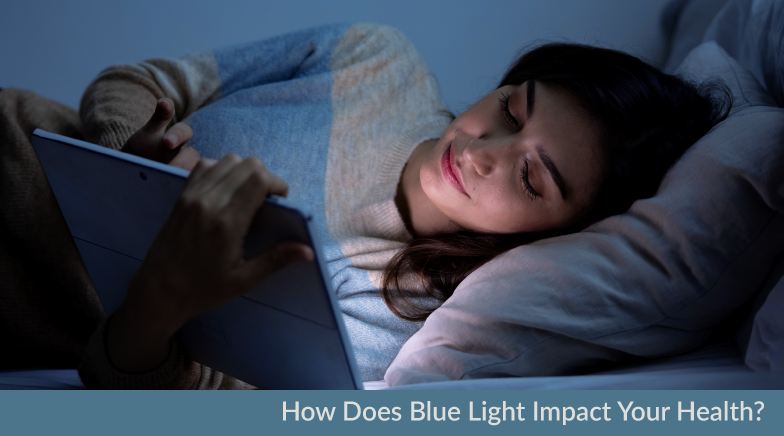In today’s digital age, our lives are increasingly intertwined with screens. From smartphones and tablets to computers and televisions, we spend a significant portion of our day staring at electronic devices. While these devices have undoubtedly revolutionized our world, they also emit a type of light that has raised concerns – blue light. Let’s explore what blue light is, where it comes from, and how it can impact your vision.
Understanding Blue Light
Blue light is a part of the visible light spectrum, which encompasses all the colors we can see. It is located at the higher-energy end of the spectrum, next to ultraviolet (UV) light. Blue light has a shorter wavelength and higher energy than other visible light colors, such as red or yellow. This unique property makes it both beneficial and potentially harmful.
Sources of Blue Light
Many might not realize it, but the primary natural source of blue light is the sun. Sunlight contains a balanced spectrum of colors, including blue light, which helps regulate our circadian rhythm, alertness, and mood.
More well know sources, modern electronic devices such as smartphones, tablets, computers, and LED televisions, also emit blue light. An often-overlooked source of blue light is energy-efficient LED and fluorescent lights, although the levels are generally lower than one might be exposed to from electronic screens. Outdoor digital billboards and signs are another source of artificial blue light.
Impact on Vision
Prolonged exposure to screens can lead to digital eye strain or computer vision syndrome. Symptoms include eye discomfort, dryness, blurred vision, and headaches. Blue light may contribute to these issues, as the eye has to work harder to focus on the high-energy, shorter wavelengths of blue light emitted from screens.
Exposure to blue light, especially in the evening, can disrupt your sleep patterns. The blue light from screens can suppress the production of melatonin, a hormone that regulates sleep. This can lead to difficulty falling asleep and reduced sleep quality, which are associated with a myriad of additional health conditions.
Some studies suggest that prolonged and high-intensity exposure to blue light may increase the risk of age-related macular degeneration (AMD). AMD is a leading cause of vision loss in older adults, affecting the macula, a small area near the center of the retina.
Mitigating the Effects of Blue Light
Blue light may be a real part of our tech-based world, but there are ways to reduce its impact on your life. Many electronic devices and computers have built-in blue light filters or “night mode” settings. Enabling these settings can reduce the amount of blue light emitted by your screens.
Taking regular breaks from screens to reduce eye strain is also a big help. The 20-20-20 rule is a helpful guideline: every 20 minutes, look at something 20 feet away for at least 20 seconds.
To improve sleep quality, avoid screens at least an hour before bedtime, or use devices with a night mode that reduces blue light emission. Your body, especially your eyes, need this chance to prepare for a good night’s sleep.
It had long been thought that blue light-blocking glasses helped to protect your eyes from the potentially harmful effects of over exposure. Recent studies cast doubt on the effectiveness of these glasses. Until more is known, you shouldn’t rely on these as an effective solution to block blue light.
Blue light is an integral part of our daily lives, both from natural and artificial sources. While it has some beneficial effects on our alertness and mood regulation, excessive exposure to blue light, especially from screens, can have adverse effects on our vision and sleep patterns. Being aware of these potential risks and taking steps to mitigate them, such as managing screen time, can help protect your eye health in our digital age. If you have additional questions about how blue light can impact you, ask your Illinois Eye Center doctor on your next clinic visit. We’d be glad to discuss your specific situation.

